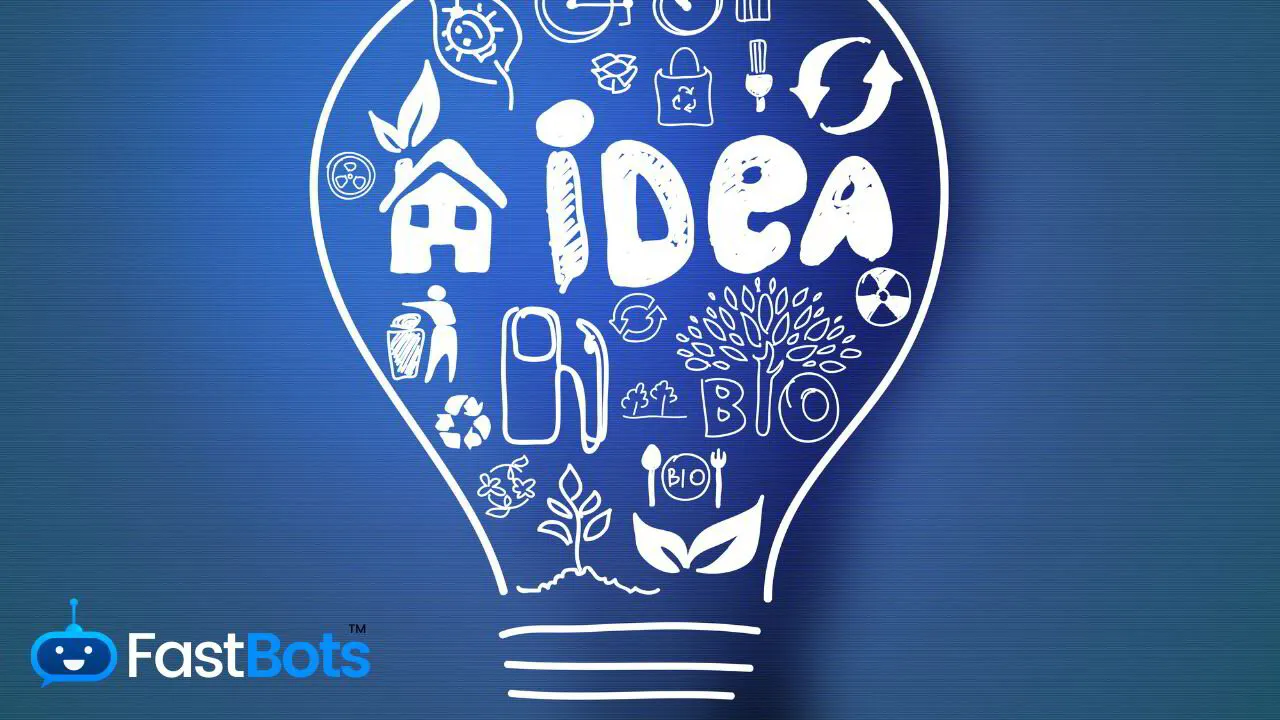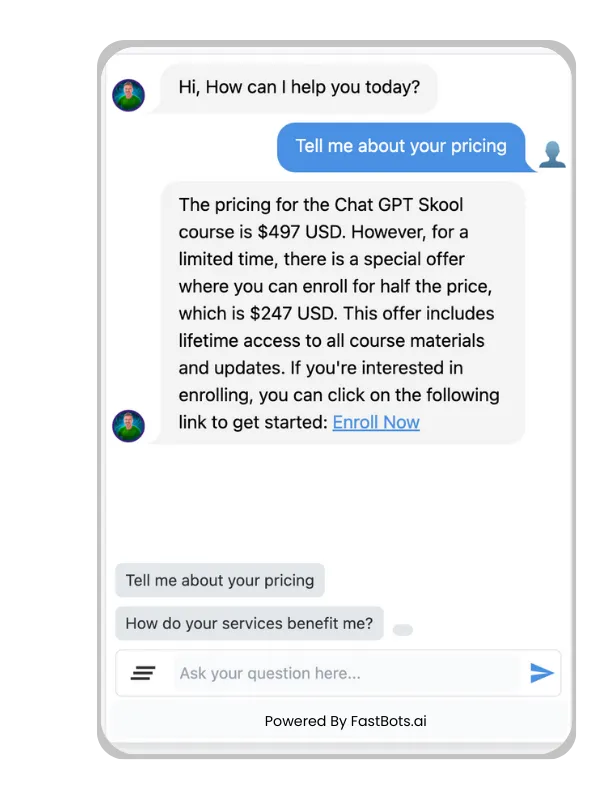In the rapidly evolving realm of digital commerce, chatbots have emerged as a powerful tool that can revolutionise how businesses interact with their customers. As automated software that engages in conversation with users, chatbots offer the convenience of round-the-clock service and the efficiency of instant responses. From simplifying customer service tasks to facilitating transactions, the utility of chatbots transcends various aspects of business operations.
Leveraging artificial intelligence, chatbots can be programmed to perform a wide array of functions tailored to your company's needs. Whether it's managing appointments or providing personalised shopping advice, these virtual assistants can significantly enhance your customers' experience. With the ability to learn from interactions, chatbots steadily improve over time, offering increasingly accurate and helpful support.
Venturing into a chatbot-based business model opens up a spectrum of opportunities to innovate and stand out in a competitive market. From content generation to lead management, chatbots can not only streamline processes but also drive growth by engaging customers in new and dynamic ways. Your business can tap into this potential and redefine the quality and efficiency of customer relationships.
THE EASIEST WAY TO BUILD YOUR OWN AI CHATBOT
In less than 5 minutes, you could have an AI chatbot fully trained on your business data assisting your Website visitors.
Market Analysis
In this section, you'll explore the dynamics of the chatbot industry, understand who your potential customers are, and see how your competitors are faring.
Industry Trends
The chatbot market is experiencing significant growth as businesses seek to enhance customer service and operational efficiency. By 2030, the banking chatbot market alone is anticipated to reach roughly $7 billion, up from $586 million in 2019. Chatbot applications are becoming more diverse, ranging from menu item suggestions in restaurants to complex customer service questions in e-commerce. The push towards increasingly sophisticated AI capabilities alludes to a market keen on innovation and user engagement.
Target audience identification
Your chatbot's target audience depends on its application. B2B chatbots are often intended for the automation of tasks like appointment scheduling and feedback collection. Alternatively, B2C chatbots focus on instant customer support and personalised shopping experiences. By analysing specific use cases and customer interaction modes, you can pinpoint demographics that not only need your chatbot but will actively engage with it for a seamless service experience.
Competitor Benchmarking
Knowing your competition is crucial. Keep an eye on key players like Google’s Bard, which showcases versatility in over 40 languages, image creation, and coding assistance. Benchmark against competitors by assessing their chatbot features, language processing capabilities, multi-functionality, and customer satisfaction rates. Your aim is to identify gaps in the market that your chatbot can fill, ensuring it stands out as not only innovative but also effective in solving consumer needs.
Innovative Chatbot Solutions
Leverage advanced chatbots to bolster your business operations. These tailored solutions cater to specific needs, streamlining processes and providing substantial value.
Customer Service Enhancement Bots
You can upgrade your customer service with chatbots that handle inquiries, resolve issues, and provide quick responses around the clock. For instance, FAQ bots efficiently field common questions, freeing up your staff to focus on more complex concerns.
E-commerce Sales Support Bots
Chatbots on e-commerce platforms guide you through the purchasing process, offer product recommendations, and help track orders. By integrating these bots, you're able to assist customers in making informed decisions and managing their purchases with ease.
Healthcare Virtual Assistants
Healthcare chatbots serve as virtual assistants, providing you with timely health information, appointment scheduling, and reminders for medication. They ensure your patients receive personalised attention even outside of regular office hours.
Financial Advisory Bots
Your financial planning can be simplified with chatbots designed to offer advice and manage transactions. Whether it's budgeting, investing, or tracking expenses, these bots can assist you with various financial tasks, ensuring accuracy and control over your finances.
Chatbot Monetisation Strategies
Incorporating chatbots into your business model offers a variety of revenue-generating avenues. Your strategy selection should align with your business goals and customer engagement preferences.
Subscription-based Models
With subscription-based models, you provide continuous value through your chatbot services. Typically, you'll offer tiered subscription plans where users pay a recurring fee for access to premium features, content, or functionalities. It's critical to ensure that your chatbot delivers consistent and evolving value to justify its ongoing cost to your subscribers.
Pay-per-Interaction Models
Pay-per-interaction models involve charging users each time they interact with your chatbot for a specific service. This could be for concierge services, expert advice, or specialised tasks that the chatbot performs. To succeed, you must clearly communicate the value provided in each interaction and set fair pricing to match the utility gained.
Advertisement Integration
Lastly, advertisement integration within your chatbot can generate revenue without causing direct costs to your users. By strategically placing ads or sponsored content that aligns with the user's interests and needs, you can leverage your chatbot as an advertising platform, creating a non-intrusive ad experience that benefits both your users and advertisers.
Technical Foundations
To ensure the success of chatbot-based business ideas, grasping the technical underpinnings remains crucial. You'll need to build a solid base in platform choice, leverage AI and ML, and master NLP techniques.
Choosing the Right Platform
When deciding on the platform for your chatbot, consider factors like compatibility with existing systems, scalability, and feature set. Common platforms include:
- Messaging services such as Facebook Messenger, WhatsApp, or Slack.
- Voice assistants, like Amazon Alexa or Google Assistant,.
- Own a website or app by integrating a chatbot directly into your business's digital assets.
Artificial intelligence and machine learning
Your chatbot's ability to learn and improve is powered by artificial intelligence (AI) and machine learning (ML) algorithms. Key elements to incorporate:
- Data training models: These are essential for refining your bot's responses over time.
- Predictive analytics: Use this to personalise interactions and anticipate user needs.
Natural language processing techniques
Natural Language Processing (NLP) techniques are vital for understanding and processing user inputs. Work on:
- Intent recognition: to determine the user's purpose.
- Entity extraction: for identifying and utilising crucial data points like dates and locations.
By building on these foundations, your chatbot can efficiently handle tasks, leading to vibrant interactions that can transform your business operations.
Marketing and user acquisition
In the realm of chatbots, effective marketing and user acquisition strategies are vital for reaching your target audience and promoting user interaction with your brand.
Content marketing strategies
You can leverage chatbots as a tool for delivering content directly to users. This personalised approach means your content can be tailored to individual preferences, boosting the relevance and effectiveness of your marketing efforts. For instance:
- Knowledge Sharing: Use chatbots to share blog posts, tutorials, or news updates relevant to your user's interests.
- Customer Queries: Implement bots to answer common questions, offering a seamless way for users to obtain valuable content.
Social media engagement
Your chatbot can significantly enhance user engagement on social media platforms. Transform passive followers into active participants by:
- Direct Interactions: Deploy chatbots to initiate conversations, answer inquiries, and provide instant support.
- Feedback Collection: Chatbots can solicit user feedback on various aspects of your business, fostering a sense of involvement and community.
Influencer Partnerships
Influencers can amplify your chatbot's presence and credibility. Integrate your bot within an influencer's social media strategy to:
- Expand Reach: Collaborate with influencers whose followers align with your target demographic, exposing your chatbot to a wider yet relevant audience.
- Authentic Endorsements: Encourage influencers to use and review your chatbot, providing their genuine opinions to promote trust and interest amongst potential users.

Legal and ethical considerations
Before implementing a chatbot for your business, you need to thoroughly understand and address the legal and ethical concerns associated with these technologies. Ensuring compliance and ethical standards are met will protect not just your users, but also the integrity and reputation of your business.
Data privacy and security
Your chatbot will handle user data, which requires strict adherence to data privacy laws. You must:
- Obtain explicit consent from users before collecting any personal information.
- Implement robust security measures to protect user data against unauthorised access.
Compliance with Regulations
You're responsible for ensuring your chatbot complies with all relevant regulations. This includes:
- Understanding international laws such as GDPR or CCPA if you serve users in Europe or California.
- Staying updated with sector-specific regulations, such as HIPAA in healthcare.
Ethical user interaction
Ethical considerations affect how you engage users through your chatbot. Ensure:
- The chatbot doesn't manipulate or deceive users.
- It provides clear information about being an AI, not a human.
Frequently Asked Questions
Chatbots represent a strategic business tool, enabling you to enhance customer interaction and streamline operations. Here's how you can leverage them for business.
How do I start a chatbot business?
Is the chatbot business profitable?
What are some engaging chatbot ideas for beginners?
Which companies have successfully integrated chatbots into their operations?
What are the most profitable chatbot applications?
How can students utilise chatbots for business projects?
THE EASIEST WAY TO BUILD YOUR OWN AI CHATBOT
In less than 5 minutes, you could have an AI chatbot fully trained on your business data assisting your Website visitors.


